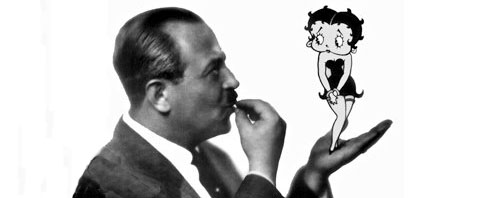

Who owns Betty Boop?

Apparently the Fleischer estate has lost a court battle for the rights to Betty Boop, a character created by Grim Natwick at Max Fleischer’s studio in 1930. Fleischer Studios has been co-licensing (with King Features) the property (along with Pudgy, Grampy, Binmbo and Ko-Ko the Clown) for several decades now.
The Fleischer Studio tried to sue Avela Inc. over its licensing of public domain Betty Boop poster images (for handbags and T-shirts). The 9th Circuit U.S. Court of Appeals (based in San Francisco) ruled against the Fleischers, saying in their decision, “If we ruled that AVELA’s depictions of Betty Boop infringed Fleischer’s trademarks, the Betty Boop character would essentially never enter the public domain.”
According to court documents, the Fleischer Studio originally assigned its rights to Betty Boop to Paramount Pictures on July 11, 1941. Paramount assigned those rights to Harvey Films, Inc on June 27th, 1958. Harvey actively licensed the character in the early 1960s. On May 15th 1980, Harvey Cartoons transferred “Betty Boop and her Gang” to Alfred Harvey and his brothers. Judge Susan Graber said there was no break in the chain of title.
So where does that leave Ms. Boop? No longer represented by the heirs of Max Fleischer and King Features Syndicate? Does this make Harvey Comics – or by extension, its current owner Classic Media – the owner of the property? Or is the character now in public domain.
For the record: The master film elements to original Fleischer Betty Boop cartoons are still owned by Paramount Pictures (and are maintained at the UCLA Film and Television Archive). Many of those films have legally entered the public domain, many others have not (they are still protected under copyrights held by Paramount/Viacom). We hope that someday the studio deems it fit to restore and release these classics on DVD.
UPDATE: Interesting analysis in the comments by animation historian David Gerstein:
Rough analysis (could be wrong):
The Betty Boop character is a Fleischer trademark.
But–Betty Boop 1930s movie posters were not copyrighted (or not renewed?) as standalone items, so are public domain.
Fleischer tried to use its active trademark on the character to stop a third party’s use of the ancient PD art. Judge said this was a no-go.What I take from the judge’s ruling is that the trademark only applies to new, modern uses of the character. It can’t be used to stop people from redistributing old PD Betty images/items. Fleischer tried to say trademark trumped copyright; the judge is saying that it doesn’t.
This is actually pretty major. In recent years, Warner has used the active trademarks on Looney Tunes characters to quash third parties’ reissues of PD 1930s/40s Looney Tunes content (of which there is a lot). If the Betty decision is not reversed on appeal, then Warner is stripped of its strongest weapon against the public domain.
It can use the trademark against those who would create new Bugs Bunny items, but not against those who would exploit old PD material that Warner failed to protect.The issue of whether Paramount legitimately sold the active Betty trademark to Harvey appears to be entirely separate, though very interesting.
